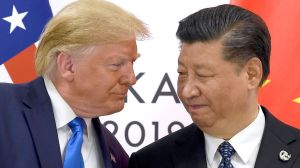Back to future, Israel builds bridges with moderates
Under American encouragement and, in some cases, pressure, Israel has quietly taken steps aimed at strengthening the standing of Palestinian...

Under American encouragement and, in some cases, pressure, Israel has quietly taken steps aimed at strengthening the standing of Palestinian moderates and has agreed to consider others now that Palestinian leader Yasser Arafat has died.
A week ago, for example, with Arafat in the final days of his life in a Paris hospital, Israel released $40 million in frozen tax funds to the Palestinian Authority after long resisting such an action, US and Israeli officials said. In addition, Prime Minister Ariel Sharon has agreed to consider removing Israeli security forces from Palestinian population areas, at the behest of the Bush administration, to facilitate Palestinian elections in the next two months, said an official.
The official said Israel had serious misgivings about the proposal, fearing that a pullback could reignite anti-Israel violence, but that Sharon’s government was willing to think about the idea under certain conditions — including if Palestinian forces could be mobilised in the Israelis’ place.
Arafat’s death is viewed as an opportunity to revive the moribund Israeli-Palestinian peace effort. Steps were already underway to have Israel make gestures to gain Palestinians’ support for Sharon’s planned withdrawal from Gaza, and with Arafat’s illness, other ideas came forward to support Palestinian moderates.
Many of the Israeli actions aimed at easing conditions of the Palestinians have been carried out with little or no publicity, in part because it suited the political interests of both Bush and Sharon. At a news conference on Friday with Prime Minister Tony Blair of Britain, Bush said there was a ‘‘great chance’’ to establish a Palestinian state. Secretary of State Colin L. Powell, speaking on NBC on Saturday, said of the new leadership: ‘‘We know these gentlemen well, and I hope to be able to see them in the very near future to discuss what their plans are and how to move forward.’’
Palestinian Prime Minister Ahmed Qurei called on Saturday for a speedy resumption of peace efforts with Israel, saying that with determination the two sides could reach an agreement ‘‘in a very short time’’.
Israel responded with another gesture on Saturday, AP said, which reported from Jerusalem that the Israeli army has decided to let Palestinian security forces carry guns in public, overturning a policy in effect since 2002. The White House and Sharon’s office are also discussing other steps to facilitate the elections that are points of dispute between Israel and Palestinians.
For example, Israel is resisting the idea of allowing Palestinians in the Jerusalem area to vote, as they did in the 1996 elections won by Arafat, on grounds that Jerusalem is not a Palestinian constituency. Sharon, in the midst of a tough fight to win approval of the Gaza pullout plan, has not wanted to be seen as yielding to US pressure, especially as some of his conservative allies are warning withdrawal will jeopardise Israeli security. Bush was loath to talk of getting Israel to make concessions while he was campaigning for re-election and counting on supporters of Israel in the Jewish and conservative Christian communities in crucial states.
While quietly pressuring Israel on some matters, Bush has given Sharon wide latitude to expand settlements in certain parts of the West Bank and to construct a separation barrier. There is also a discussion between Israel and US about what would most strengthen the hand of Mahmoud Abbas, who has emerged as the principal Palestinian leader. —NYT






- 01
- 02
- 03
- 04
- 05

























